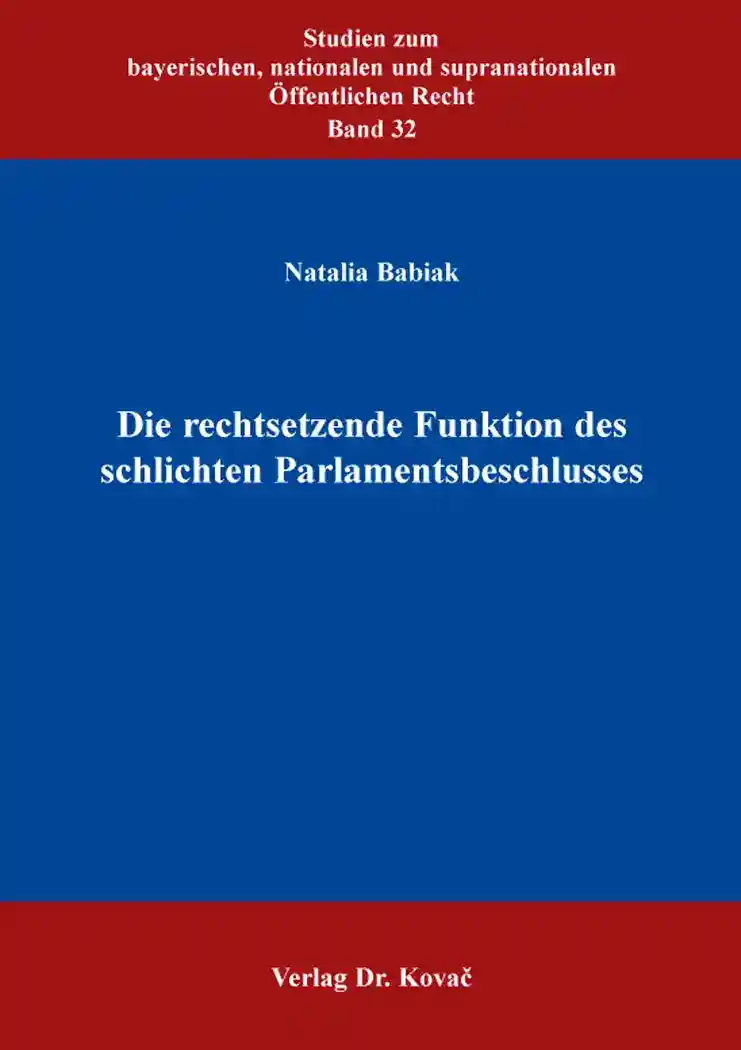Natalia BabiakDie rechtsetzende Funktion des schlichten Parlamentsbeschlusses
Studien zum bayerischen, nationalen und supranationalen Öffentlichen Recht, volume 32
Hamburg 2021, 532 pages
ISBN 978-3-339-12074-8 (print) |ISBN 978-3-339-12075-5 (eBook)
Rezension
[...] Insgesamt erweist sich das Buch als wertvoller Beitrag zur rechtlichen Einordnung von Parlamentsbeschlüssen. Dazu trägt neben der eingehenden deskriptiven Darstellung der Rechtsprechung und parlamentarischen Praxis insbesondere die grundlegende Aufarbeitung von Wesen und Inhalt der Parlamentsbeschlüsse außerhalb des Gesetzgebungsverfahrens bei. Das Buch gehört in jede Parlaments- und Fraktionsbibliothek. Darüber hinaus ist es für Verfassungs- und Parlamentsrechtler, Praktiker in der Parlamentsarbeit und in den Regierungsstellen sowie auch für jeden, der sich mit parlamentsrechtlichen Fragen befasst, ein unverzichtbarer Wegweiser.
About this book deutschenglish
The German Parliament can issue acts of law (called Acts of Parliament) as well as, in some matters, simple parliamentary decisions (Schlichter Parlamentsbeschluss). This book deals with the question of the legal power of the latter.
The book presents the current state of opinion, both in the literature and the case law. Subsequently, the simple parliamentary decisions are based on their parliamentary functions and the category of so-called „qualified parliamentary decisions“ is formed. These are, in difference to most of the simple parliamentary decisions, legally binding for their recipients. The best examples arising from the interpretation of the Constitution’s articles are the decisions on the deployment of armed forces abroad and responsibility for integration within the framework of EU legislation. One of the examples to be found directly in the Bavarian State Parliament is its approval to state treaties according to Art. 72 Para. 2 BayVerf. (The Constitution of the Free State of Bavaria). These are, in fact, permissions for the government to act, but not injunctions.
The second part of the book deals with the question of whether the described qualified parliamentary decisions can essentially be understood as Parliament‘s legislation. The decisions are researched under the legislative function of the Parliament and it is analyzed which acts require a legal form and which do not. The most decisive aspect allowing to categorize them as form of the legislative acts is the interpretation of the „theory of essentialness“ (Wesentlichkeitstheorie), the reservation of the law (Vorbehalt des Gesetzes), the parliamentary reservation (Parlamentsvorbehalt) and the supremacy of law. Additionally, the freedom of the parliament to decide freely in what form its instruments of actions are issued is questioned and a limited scope of that freedom is determined.
Finally, the qualified parliamentary decision is analysed within the framework of the legal enactments published by executive organs in response to the acts of law, particularly taking into account the Parliament’s Right of Revision (Änderungsvorbehalt).
Keywords
BundestagDemokratieGesetzgebungsverfahrenIntegrationsverantwortungParlamentsbeschlussParlamentsvorbehaltQualifizierter BeschlussRechtsverordnungenSchlichter ParlamentsbeschlussStreitkräfteVorbehalt des GesetzesWesentlichkeitstheorieIhr Werk im Verlag Dr. Kovač

Möchten Sie Ihre wissenschaftliche Arbeit publizieren? Erfahren Sie mehr über unsere günstigen Konditionen und unseren Service für Autorinnen und Autoren.
